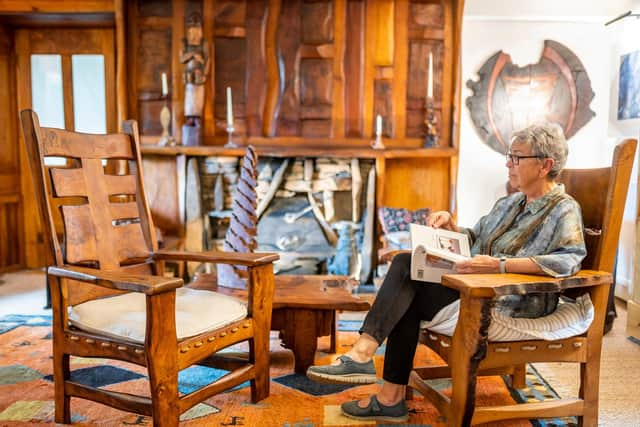Sitting down: Effect on health is so bad that chairs are being described as serial killers – Alastair Dalton
That’s the stark warning from recreation consultant Mike Dales, who reckons that almost all of us must stand up and move around much more.
He describes the chair as “the Grim Reaper’s new weapon of mass destruction”.
Advertisement
Hide AdAdvertisement
Hide AdDales goes so far as to say each one should carry a prominent warning sign that it is a potential health hazard, could shorten your life and could even contribute to bankrupting the country – because of the multi-billion-pound annual cost of obesity it helps cause.
But such shock tactics in his new book, Find Time to Exercise, don’t end there.
In a YouTube video to promote it, Dales further emphasises the point in a scene more akin to a horror film, in which he takes a sledgehammer to a garden deck chair.
However, if you think that’s exaggerated and over the top, it’s just what Nanette Mutrie, professor of physical activity for health at the University of Edinburgh, told me several years ago, to my initial disbelief.
In a nutshell, how ever much you exercise, it cannot cancel out the negative impact of prolonged sitting.
Being myself a natural for readily following health advice, such as about the dangers of smoking and taking drugs, I soon became a convert to standing desks and bought one for the office from a colleague, with cardboard boxes now a not-so-temporary working from home substitute, 18 months on.
That’s just as well, because Dales, a Perth-based former Mountaineering Council for Scotland official, wants us to see chairs in an entirely new light.
They should not be thought of as “comfortable” and “cushy”, he argues, but the “nasty, evil serial killers they have become”.
Strong stuff. But he does have a point.


Advertisement
Hide AdAdvertisement
Hide AdThey make our legs numb through lack of movement, reduce calorie burn, slow brain function and cut our ability to shed fat.
There’s an inevitable element of being preachy about books like these, but Dales is down to earth in his approach, and most entertainingly, details many fun challenges to inspire ways of increasing personal fitness.
He rightly sings the praises of Parkrun, the free, weekly 5km events staged in nearly 1,000 places across the UK, which I’m becoming addicted to after taking part in just seven.
There’s also a name check for the inspirational NHS app Couch to 5K which got me properly running again last year after a gap of two decades.


But in a sign that once you start, you want to get onto the next level, Dales lists many other alluring, if some slightly mad, tests of will power and endurance.
Such as the Marcothon, named after Marco Consani, in which you have to run every day in December.
Or the 496 Challenge, to run as many kilometres as that day’s date in the month, which adds up to 496km (308 miles) after 31 days.
The book starts with the sobering observation made nearly 150 years ago by Victorian-era Prime Minister Edward Smith-Stanley: “Those who think they have not time for bodily exercise will sooner or later have to find time for illness.”
Advertisement
Hide AdAdvertisement
Hide AdDales ends it by urging the reader: “Now go outside and play.”
That’s inspiration enough for me.
A message from the Editor:
Thank you for reading this article. We're more reliant on your support than ever as the shift in consumer habits brought about by coronavirus impacts our advertisers.
If you haven't already, please consider supporting our trusted, fact-checked journalism by taking out a digital subscription.
Comments
Want to join the conversation? Please or to comment on this article.
